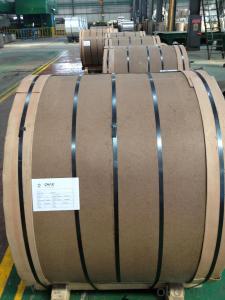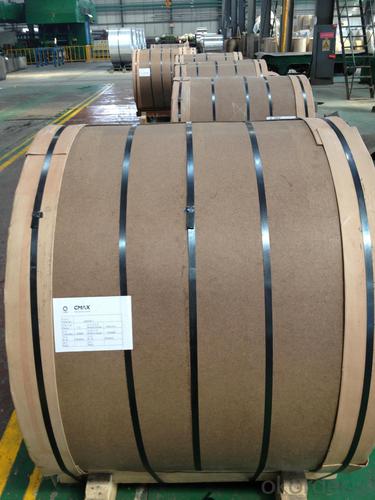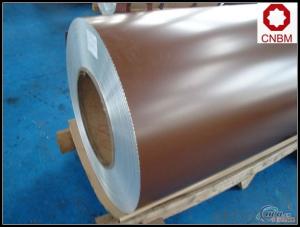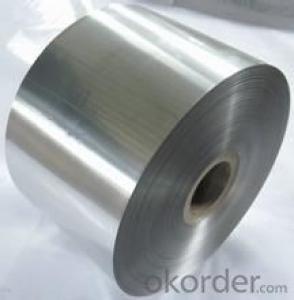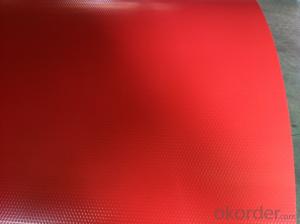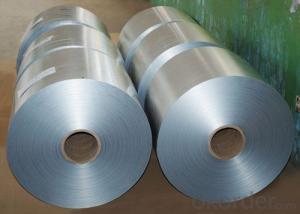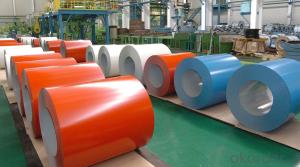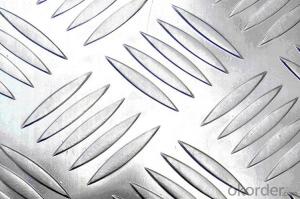Ruud Aluminum Coils - 2.4mm Aluminium Coil
- Loading Port:
- China Main Port
- Payment Terms:
- TT OR LC
- Min Order Qty:
- -
- Supply Capability:
- -
OKorder Service Pledge
Quality Product, Order Online Tracking, Timely Delivery
OKorder Financial Service
Credit Rating, Credit Services, Credit Purchasing
You Might Also Like
Specifications
1:mill finish aluminum coil
2:ISO9001,SGS,CCS test certificate
3:Width can reach 2500mm.
4:DC and CC material is available.
mill finish aluminum coil
| Product | Aluminum Coil |
| Alloy | 1050, 1060, 1070,1080,1085,1100, 1200,1145 3003, 3004,3005, 3102,3103,3104,3105, 3A21 5052,5052A,5657, 5754,5082,5083,6061,7075,8006,8011,8079 |
| Temper | O, H12, H14, H16,H18 H22,H24,H26,H28,H32,H34,H36,H38 |
| Thickness | 0.2mm-7.0mm(Or Customer's requirement) |
| Width | Under 2500mm |
| Lead Time | Within 20 days after receiving deposit |
| Packing | Standard Exporting wooden pallets |
| Surface: | Bright & Smooth Surface, Free from defects like white Rust, Oil Patch, Edge Damage. |
| Application | PP cap stock, hot rolled thick plate, PS base plate, aluminum curtain wall base plate, the traffic sign ,air-conditioner heat and exchangers, food container, household foil, pharmaceutical packing, cigarettes packing, |
- Q: What are the different slitting options for aluminum coils?
- Aluminum coils offer a variety of slitting options to meet specific requirements and end uses. The commonly employed choices for slitting aluminum coils are as follows: 1. Single Slit: The most fundamental and extensively utilized option involves cutting the aluminum coil into two narrower coils with a single cut at the center. 2. Double Slit: This option entails two parallel cuts along the center of the aluminum coil, resulting in smaller widths for each coil. 3. Multi-Slit: Multiple parallel cuts along the center of the aluminum coil allow for the creation of several narrower coils from a wider one. 4. Ribbon Slit: When the aluminum coil needs to be divided into very thin strips, like those used in electrical wiring or packaging, this slitting option is employed. 5. Oscillate Slit: This option suits applications that require varying widths of aluminum strips. The coil is slit in a back-and-forth motion, offering flexibility in producing different widths. 6. Custom Slitting: To accommodate specific project needs, custom slitting options can be employed. This involves tailoring the slitting process to achieve unique widths, lengths, or shapes of aluminum strips. When selecting the appropriate slitting option for aluminum coils, it is crucial to consider the desired application, required dimensions, and the capabilities of the slitting equipment.
- Q: How to pull the aluminum coil purchased into aluminum sheet?
- You can buy flat sheet directly next time to avoid trouble.
- Q: What are the different grades of aluminum used in coil production?
- There are several different grades of aluminum that are commonly used in coil production. Each grade has its own unique properties and characteristics that make it suitable for specific applications. Some of the most commonly used grades include: 1. 1100 Aluminum: This grade is considered commercially pure aluminum and is known for its excellent corrosion resistance and high thermal conductivity. It is often used in applications such as heat exchangers, fin stock, and evaporator coils. 2. 3003 Aluminum: This grade is alloyed with manganese, making it stronger and more durable than 1100 aluminum. It also has good formability and weldability properties, making it suitable for a wide range of coil production applications, including roofing, gutters, and general sheet metal work. 3. 5052 Aluminum: This grade is alloyed with magnesium and has excellent corrosion resistance and high strength. It is commonly used in marine applications, such as boat hulls and components, as well as in architectural and automotive applications. 4. 6061 Aluminum: This grade is one of the most versatile aluminum alloys and is known for its high strength and excellent machinability. It is often used in structural applications, such as aircraft parts, truck frames, and industrial equipment. 5. 7075 Aluminum: This grade is one of the highest strength aluminum alloys available and is commonly used in aerospace and defense applications. It has excellent fatigue resistance and is often used in the production of aircraft wing spars, fuselage frames, and missile components. These are just a few examples of the different grades of aluminum used in coil production. The specific grade chosen will depend on the desired properties and requirements of the application.
- Q: What is the minimum thickness available for aluminum coils?
- The specific requirements of the application can cause variations in the minimum thickness available for aluminum coils. Typically, aluminum coils can have a minimum thickness of approximately 0.006 inches or 0.15 millimeters. It is crucial to consider that different industries or uses may impose distinct minimum thickness demands. Therefore, it is advisable to seek guidance from a manufacturer or supplier to ascertain the suitable thickness for a particular application.
- Q: What are some normal everyday products made from aluminum that I can use to recycle?
- Soda cans. Beer cans. Pie tins. Aluminum foil. Traffic signs. A few components of some automobiles like the hood (bonnet) and the cylinder heads for some engines. Airplanes - most all the structure metal and all the skins in all but the newest composite (fiberglass) planes. Aluminum recycling uses so much less energy than refining from bauxite ore that a high percentage of aluminum gets recycled.
- Q: Can aluminum coils be painted or coated after installation?
- After installation, it is indeed possible to paint or coat aluminum coils. Aluminum, being a versatile material, lends itself well to painting or coating in order to improve its aesthetics or offer extra safeguarding. Opting to paint or coat aluminum coils subsequent to installation can effectively thwart corrosion, enhance durability, and yield a personalized finish. The selection of paint or coating hinges upon the specific necessities and desired results. Prior to applying any paint or coating, it is crucial to thoroughly clean and prepare the aluminum surface to ensure strong adhesion and long-lasting results.
- Q: What is the corrosion resistance of aluminum coils?
- Aluminum coils have excellent corrosion resistance due to the formation of a protective oxide layer on their surface. This oxide layer acts as a barrier, preventing further corrosion and making aluminum coils highly resistant to various environmental conditions and corrosive elements.
- Q: Can aluminum coils be formed or shaped?
- Certainly, aluminum coils have the capability to undergo formation and shaping. Aluminum, being an extremely pliable metal, can effortlessly be molded or bent into diverse configurations without experiencing any fractures or breaks. Aluminum coils frequently find usage in numerous applications including the production of heat exchangers, condenser coils, evaporator coils, and air conditioning systems. These coils can be transformed into various structures such as flat sheets, tubes, or finned coils, catering to the specific demands of the intended purpose. The adaptability and formability of aluminum coils render them exceptionally versatile and extensively employed across multiple industries.
- Q: Are aluminum coils suitable for heat exchangers?
- Aluminum coils are indeed a fitting choice for heat exchangers. This is because aluminum possesses exceptional thermal conductivity, making it highly efficient and effective in transferring heat between mediums. Its ability to swiftly transfer heat from one medium to another is particularly advantageous for heat exchangers that require efficient heat transfer. Furthermore, aluminum coils are lightweight, resistant to corrosion, and boast excellent durability. These qualities contribute to their popularity in a wide range of applications, including heat exchangers. The corrosion resistance of aluminum ensures that the coils can endure harsh environments and prevent the occurrence of rust or corrosion, thereby prolonging the heat exchanger's lifespan. Moreover, aluminum coils are easily moldable and can be shaped into various forms, allowing for flexibility in designing and constructing heat exchangers. This adaptability makes them suitable for a diverse array of applications, such as HVAC systems, refrigeration units, and automotive cooling systems. In conclusion, the high thermal conductivity, lightweight nature, corrosion resistance, durability, and versatility of aluminum coils make them well-suited for heat exchangers. These properties establish aluminum coils as an excellent choice for achieving efficient heat transfer in numerous industries.
- Q: Are aluminum coils resistant to saltwater corrosion?
- Yes, aluminum coils are resistant to saltwater corrosion.
Send your message to us
Ruud Aluminum Coils - 2.4mm Aluminium Coil
- Loading Port:
- China Main Port
- Payment Terms:
- TT OR LC
- Min Order Qty:
- -
- Supply Capability:
- -
OKorder Service Pledge
Quality Product, Order Online Tracking, Timely Delivery
OKorder Financial Service
Credit Rating, Credit Services, Credit Purchasing
Similar products
Hot products
Hot Searches
Related keywords
